A parable about what’s true when you build A THING – with your hands or in business.
10 minutes
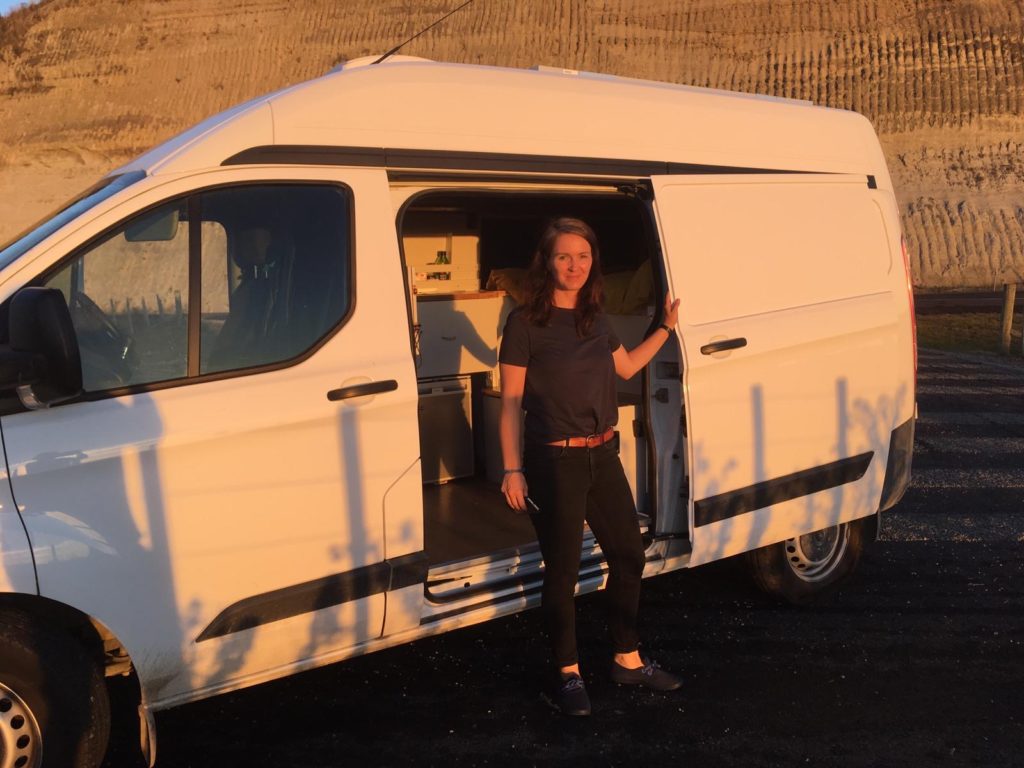
I moved from Germany to New Zealand. And with that, I exchanged my FinTech career to craftsmanship. Well, to be honest, I haven’t earned the Chief Camper Van Builder title just yet and I am back married to financial technology – I love doing what I am doing!
Let’s rewind and go back for a moment
I have lived in Germany with my Kiwi partner for a couple of years. Fun times but New Zealand was tempting – the most breathtaking sceneries, mountains, the pacific ocean, stunning beaches that you are still often the only person walking on. So many beautiful hikes that they will last us for the rest of our lives. So we decided to leave and do the thing you have to do as a real Kiwi – build something with your bare hands. And if that ‘something’ is a camper, the respect from outdoor-loving New Zealanders is secured.
Sold everything, shipped 10 boxes on a container ship to the end of the world, bought a ford transit custom, shipped German insulation material on our last day in Germany, and off we went. 30 hours later we arrived in Wellington, our new home.
A sabbatical with purpose
Instead of getting right into work, we decided to take time off – up to a year was the plan – to build a camper van and go on tour with it. Oh, what a bold move! We were total beginners in every handyman skill needed, yet had the guts and some blind trust in ourselves. I don’t know how we were able to justify this – likely cause you don’t know until you know. And oh boy, I can tell you it was a mission full of surprises. And one of the best things I had the guts to just do. Zero skills in the field? Well, f*** it. I want a camper!

Here are the 8 things I have learned from building a camper van
1. It’s about the mindset
Where would we all be without overcoming fear and trying new things? Right, we were still babies with no abilities to manage life on our own. A lot has been written about the fixed versus growth mindset, thanks to the science conducted by Carol Dweck. Building a camper van throws this theoretical information right into your beautiful face. Just one example: I have never held a jigsaw, mitre saw, or any electronic saw in my life. I have never thought about which side I need to saw on and the type of blade that makes it look smooth. Or, how important it is to wear safety glasses – especially in the windiest city in the world – Wellington. You get the point – if I had believed that I can’t do it cause I had never done it, I wouldn’t have achieved fitting a single piece of wood into the van.
But I did! Looking at the finished van, the trained eye will see where I started, where I made progress and learned skills. I went from pretty ugly to half beautiful results. Without believing that I can just learn and grow my skills along the way and being ok with some mediocre results and ugly mistakes, I would have never succeeded.
2. Stamina beats knowledge
Even if I had some experience let’s say in how to use a jigsaw, I would have still had no idea about electrics (we have a fabulous solar set-up) or about building wooden, asymmetrical boxes and designing a bench and a kitchen unit that doesn’t fall into pieces while driving. Will the design and the build be suitable for real-life adventures? No idea. We had a lot of knowledge that we simply didn’t have.
So what we needed was stamina. We needed to push through the hard times where everything seemed like too much. We never had a comfortable level of knowledge and were constantly operating on minimum skill level and no experience. What was important was the ability to learn fast, iterate, fail and start over again. Just like in any excellent agile organisation. Here it was, condensed and with power that slammed me right in my face. You can get the knowledge everywhere (Thanks to Google) but stamina… Stamina only lives in yourself.
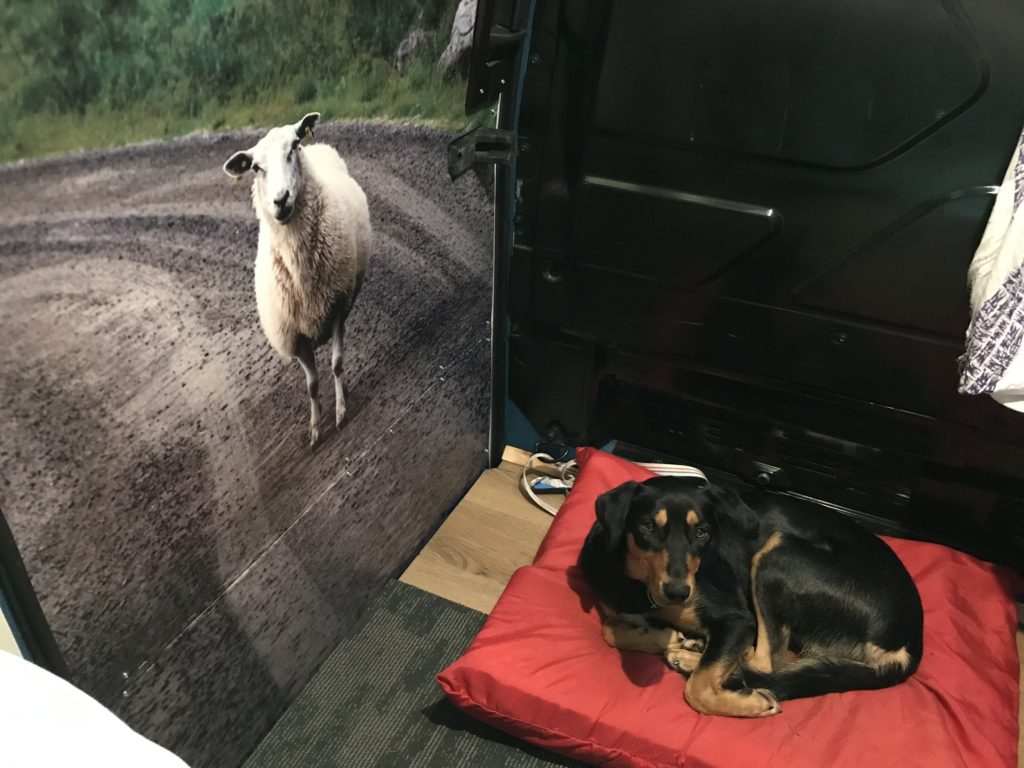
3. The limits of communication are the words you know
It wasn’t just me working on the van – there was my partner as well as a couple of people along the way. We talked to heaps of Mitre10 and Bunnings Warehouse employees (NZ hardware stores) during our journey. And I can tell you, it wasn’t always without misunderstandings and drama. My partner and I don’t belong to the couples that have a lot of trouble communicating – we don’t have the tendency to pick fights like you’d pick cherries off the tree in summertime.
No words, more drama
But yes, you can imagine, we had some drama sticking its ugly nose into our business. What happened? Mostly one thing was apparent – we didn’t have the right words nor the right way to put the words to talk about the unknown. And we were acting in high-stress situations. Just like in work life, there were 2 aspects that we underestimated.
- You can’t talk about it when you don’t have the words!
- When you experience stress, you make mistakes it quickly gets costly and unpleasant.
Starting something from scratch means you also begin the language associated with the task from scratch. You need to learn the vocabulary to make yourself understandable to another person. That applies for work situation in the same way – have never done this specific task? Have never worked in a tech environment? Chances are high, you will get the wrong messages and can’t process the words in a way that makes sense. Chances are high you talk, and all it does to the listener is causing a face that looks like a million question marks.
Then the stress kicks in. What does stress do to a person who simply doesn’t have the words to say what is required in the situation? Well, I got frustrated, my partner got frustrated, we started shifting our tone from joyful to pi**ed, and voila, our mood turned into the red zone. Just like when a client is demanding something, and you don’t have the time and the means to respond appropriately. In a team setting, you should better have a well thought through procedure ensuring you understand decisions, responsibilities, goals, strategy, the vision and every task you want to tackle together.
4. Unquestioned advice might kill your progress
I always have at least half of my body and mind in product management. Besides making everyone else get out their superpowers, my mind comes from the product and its real value and purpose for people. And along that way, I ask a lot of people about their opinions, I seek help when I don’t know it myself or want a fresh perspective.
Back to the van. When we went into the many, many hardware stores, we started out asking a lot of questions. We thought the staff must know more than us.
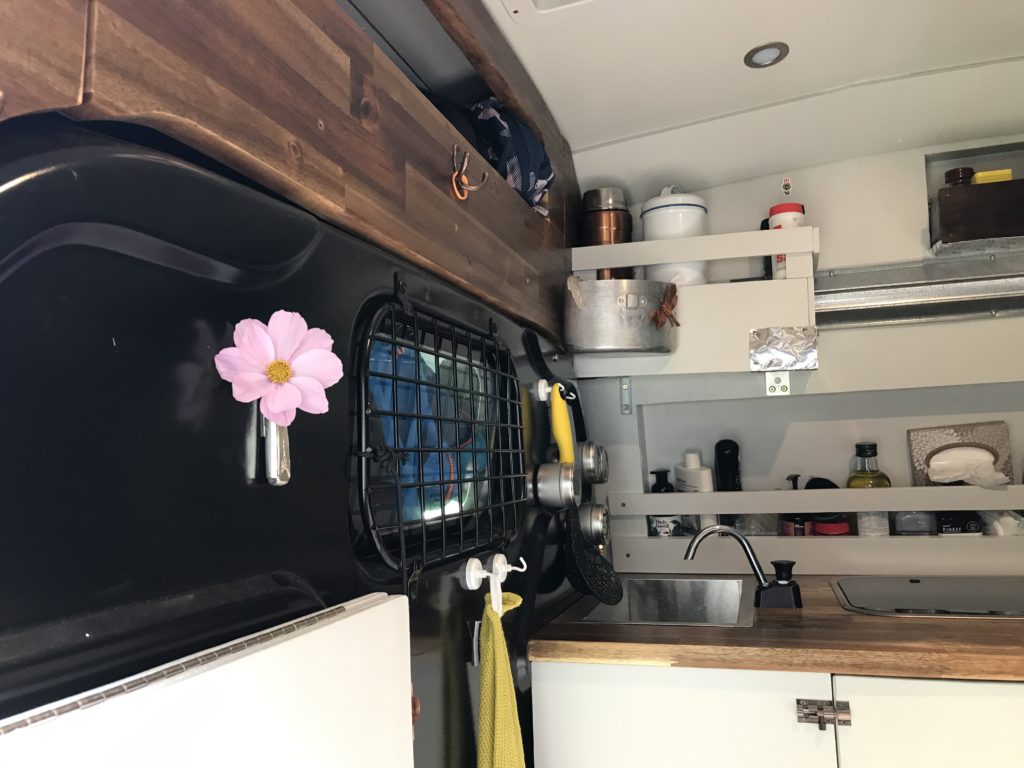
And to some extent, that was true. But not when it went from generic – fits everyone type of advice – to the details. Then the experts failed severely. Why is that? Cause only we knew the details. We knew that we needed to bend the rules to make our van a success, only we knew the way our van behaved differently to houses or other campers. Only we knew about the van’s special characteristics and about what we wanted it to be.
As important as it is to seek advice, it is equally important to adapt the input into your unique context. Some rules might not apply to you, and you may fail when you try to walk another one’s path without considering what’s unique to YOUR thing.
5. Only the ones who adjust will be winners.
Winning in the case of our camper conversion is measured by the van’s functionality while using it. It needs to for instance:
- not break down immediately
- last for decades ahead (after all, It is an expensive thing to do on your sabbatical!)
- meet all your unique use cases and personal needs.
The thing is: there is no straight path to your desired result. And there is nothing better than our van to showcase how desperately you are in need of constant adjustments to the realities.
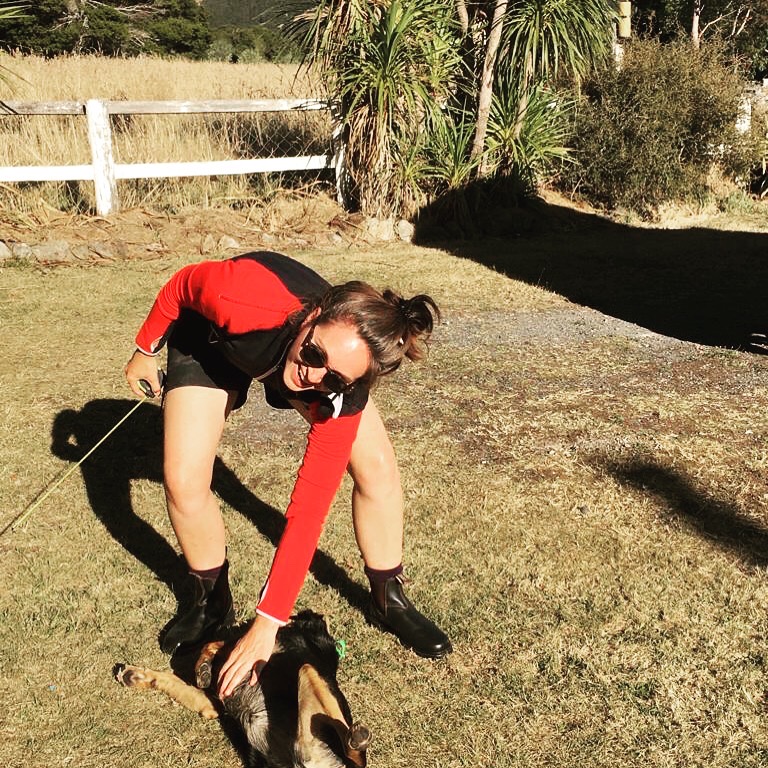
There is good planning and bad planning
When we started planning, we did it on paper – only to realise, that it can only go as far as a rather vague vision of what we want it to look like and how we want it to function.
Measures can guide you but won’t always shape the whole path to success
You take all the dimensions of the bare van and note it down on paper. Then you start putting in your objects where you think they should be. Once your plan is finished and you have agreed on it with your team (in this case my partner), you start building. You put in the insulation, then the plywood walls and the floor only to realise that you then have to measure everything again. In such a complicated and bendy space, simply adding up layers of the known dimensions to figure out the dimensions after that is not enough. So you have to adapt, measure again and in the worst case, completely change your ideas and do something else. That leads us to the next:
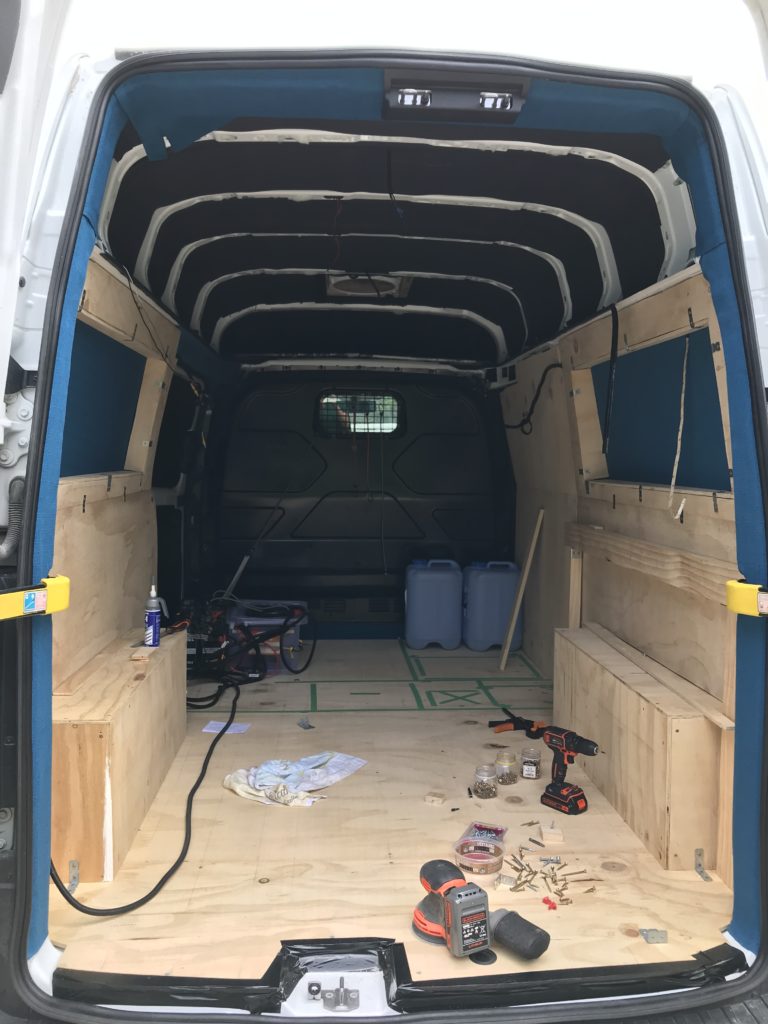
Don’t stick to an idea just because you found it important in the past
If the concept isn’t gonna be successful and you have a feeling, trust it. Just cause you defined something some time ago it doesn’t mean it should never be questioned. In our situation – the one thing we agreed on being the untouchable decision was to have a full length and width bed for our best sleeping experience. Only we realised that it wouldn’t fit in with also meeting other vital requirements like an easily accessible inside the kitchen, a seat and a computer workspace. We had to adapt cause we saw the realities kicking in over the course of time. The more time we spend with figuring out our needs, the more complex it got to make decisions about the compromise we need to be happy in ALL of the important dimensions. We decided to rethink our design and did it entirely different than we decided in the first iteration. Are we happy with the result? Slaughtering the one thing we said is holy to us? Yes, we are! Considering what we learned along the way, we have incorporated these learnings in the best possible way.
6. If nothing is a straight line, you better bend the rules
Our van is probably the worst van you could have chosen to convert into a camper. Cause we didn’t know any better, we decided for it for reasons that made sense to us at the time. We bought it unseen, still back in Germany, in a place called Timaru from a lovely ford salesman. Our main criteria were great safety features, we can stand upright, can take a proper bed (you know how that turned out) and is still small enough to be driven in the city on a daily base as our own vehicle.
Turns out, it is the most uneven little van in our universe. That’s why you don’t see anyone’s youtube videos converting that model into a camper. Well, we did. And we had to be very open to bending some rules to make it happen – just like you have to when you are disrupting a business model.
One example out of many
We had tough times to cover a nasty bit of metal sticking out on both sides of the van – full length including all the cables that modern vehicles tend to have. We somehow had to cover it up while also covering all the cables behind it. Nothing seemed to work. Then we saw RONDO. The friendly Hardware store employee in Martinborough, NZ said he has no idea what it is for, but many people buy these several meter long metal things. We didn’t care about what it is used for. We bend the rules – and the metal – to make it fit just right. Covering up the ugly and nasty sticky out bit that was left uncovered between the plywood for so long it was painful to see it every day.
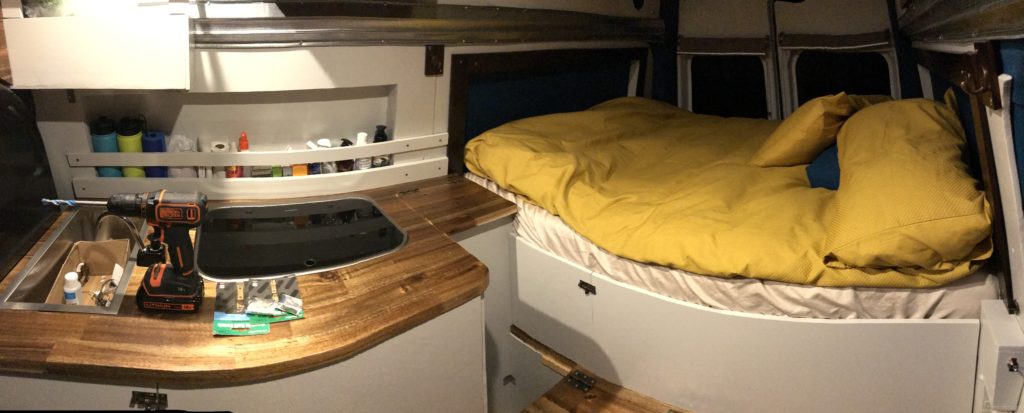
7. If you envision the end result, you will get there.
Now that I talked a lot about plans not turning out in reality. There is still something incredibly important in planning. Let’s not call it planning. It is envisioning the result. What you want to achieve, you should look at over and over again to not lose track along the way. If you know where you want to go and why you want to go there, you will reach it eventually.
We sat back and reminded ourselves why we are doing it and how it needs to be to satisfy our demand. We had many times during the process when we thought we will never make it. But we did. With zero skills in carpentry and building before we started. But we made it, cause we learned, grew, listened, adapted and knew when to bend the rules and listen to our ‘voice of experience in execution’ when it was necessary.
8. Good enough beats perfectionism
My partner and I had a constant struggle with two conflicting approaches. The perfectionist mindset wanted to get everything perfect. But the problem with perfect is that it makes you fear to do things and delay progress for the sake of thinking about it. Every project needs to end and have a defined outcome. Perfectionism hinders you from making meaningful progress. It is ok to make mistakes and fix or live with them. It is not ok to avoid mistakes altogether and end up – in the worst case – in the no-mans-land of progress where there is no progress. A certain extent of anticipation is helpful. Over-doing it tough, makes you slow while still not making you mistake-free. So good enough is good enough. Iterate and get rid of the unwanted along the way.
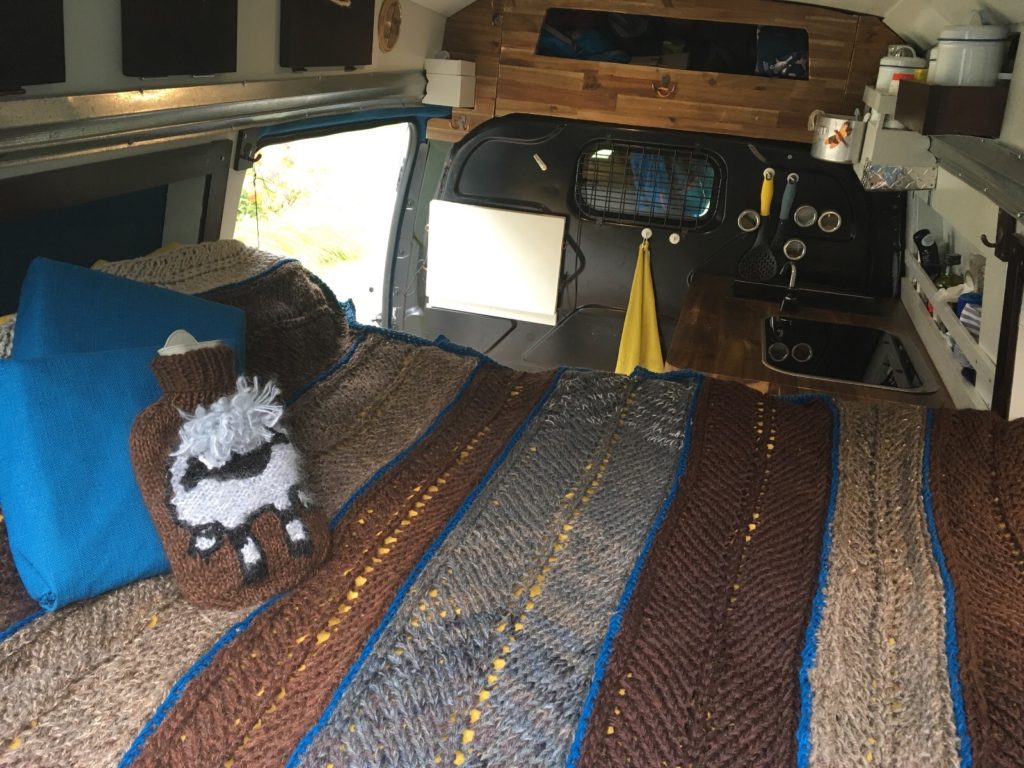
Not all of these learnings are new or never spoken of. Quite the contrary. Encountering these lessons while doing something you have never done before in a context that puts you off your desk and down to earth again still had great power for me. I wish for everyone to go through this and listen to what is happening throughout the process.
So go and get yourself a camper! AKA a project that scares you.
Would I do it again? Oh yes! It taught me a lot and left me satisfied with our creation for now and hopefully many years to come – travelling through the most stunning and ever-changing landscapes of this world – a fabulous country called Aotearoa (The land of the long white cloud).